- Home
- Scott Mariani
The Mozart Conspiracy: A Novel bh-2 Page 3
The Mozart Conspiracy: A Novel bh-2 Read online
Page 3
‘You’d better come inside,’ she said to Ben.
He shouldered past the two men and stepped into the room.
Room 1221 was a vast suite filled with the scent of flowers. Pale sunlight filtered in through three tall windows, flanked with heavy drapes. Leigh led him inside and closed the door quietly, shutting the bodyguards out in the corridor.
They faced one another uncertainly.
‘Fifteen years,’ he said. She was still the same Leigh he remembered, still beautiful. The same willowy figure, the same perfect skin. Those green eyes. She was wearing faded jeans and a navy sweater. No makeup. She didn’t need it. The only piece of jewellery she had on was a gold locket on a thin chain around her neck. Her hair hung down loose over her shoulders, black and glossy, just as he’d remembered it.
‘Ben Hope,’ she said frostily, looking up at him. ‘I promised myself that the next time I saw you I was going to slap your face.’
‘Is that what you called me for?’ he said. ‘Now I’m here, feel free.’
‘It didn’t look like you were going to turn up.’
‘I just got your message last night. I came straight here.’
‘I left it days ago.’
‘I was busy,’ he said.
‘Right,’ she snorted.
‘I got the impression you needed my help,’ he said. ‘Now it seems as though I’m not exactly welcome.’
She looked at him defiantly. ‘I don’t need you any more. I panicked, that’s all. I shouldn’t have called you. I’ve got things under control now.’
‘Your reception committee? I noticed.’
‘If you’ve gone out of your way to get here, I’ll make it worth your while.’ Her handbag was lying on an armchair. She walked over to it, took out her purse and started counting banknotes.
‘I don’t want your money, Leigh. I want to know what’s going on.’ He jerked his thumb over his shoulder. ‘You’re putting on a circus?’
She put the purse down. ‘I don’t understand.’
‘Why else would you hire a bunch of clowns?’
‘They’re for protection.’
‘They couldn’t protect you from a gang of Quakers.’
‘I had to hire someone. You weren’t there. Just like the other time.’
‘I’m here now,’ he said. ‘I’ve come all this way-at least tell me what’s going on.’
She sighed, relenting. ‘All right. I’m sorry. I’m tired and I’m scared. I need a drink. Want one?’
Ben laid his brown leather jacket on the back of a settee. ‘That sounds like a good start,’ he said. ‘I could do with a decent Scotch, after that crap they gave me on the flight.’
‘You still like your whisky.’ Leigh opened an oriental drinks cabinet and took out a green bottle. He thought he could see a slight tremor in her hand. ‘Single malt?’ she asked. She filled her own glass as full as his. He couldn’t recall that she drank. But then, she’d been a girl of nineteen in those days. So much time had passed. He realized he hardly knew her any more.
She took an agitated sip of the whisky, pulled a disgusted face and gave a little splutter. ‘I’m in trouble. Something happened to me.’
‘Sit down and tell me everything,’ he said.
They sat facing one another in comfortable armchairs either side of a coffee table with an ornate etched glass top. His glass was already empty. He reached for the bottle and poured another double measure.
Leigh brushed a strand of hair away from her face. She swivelled her whisky glass on the tabletop as she spoke. ‘I’ve been in London for six weeks for work,’ she said. ‘Doing Tosca at the Royal Opera. I rent a little flat not far from the Opera House. It was the morning after the last show. I was planning to hang around for a while. I’d been doing some shopping in Covent Garden. I was walking back towards the flat. It’s in a quiet street where there’s often nobody about. I could sense that someone was watching me. You know, that feeling that you’re not alone?’
‘Go on.’
‘They were in a car, a big dark-coloured car. I don’t remember what type. Just following me along at walking pace. At first I thought it was photographers, or some kind of kerb crawler. I was trying to ignore them, walking faster. Then the car swerved up onto the pavement in front of me, cut me off. I tried to go round the other way, but they got out and blocked me.’
‘Can you describe them?’
She nodded. ‘There were three, the driver plus two more. Well-dressed, dark suits. They looked like businessmen. One of them told me to get into the car. When I tried to run, he grabbed me.’
‘How did you manage to get away?’
She smiled darkly. ‘One thing about living in Monte Carlo-some people say it’s a bit of a police state, but at least it’s safe for women to walk the streets. Anywhere else I go, Europe or the USA, I always carry a can of Mace.’
He blinked. ‘You had Mace?’
She shook her head. ‘In free Britain? You must be kidding. I carry a little can of hairspray. While he was hanging on to my arm, I sprayed him in the eyes with it.’
‘Crude, but effective.’
She sighed, leaning her head on her hands, the thick black hair hiding her face. ‘I never thought I’d have to use it,’ she said quietly. ‘It was terrible. I keep seeing it, over and over in my mind. He let go, screaming and rubbing his eyes. He reached into his jacket and pulled out a gun. I ran like crazy. They came after me. I’m a fast runner but they would have caught me if it hadn’t been for the cab that just happened to come by. I told the cabbie drive, just drive. I haven’t been back to the flat since.’ She looked at him with worry in her eyes. ‘So what do you think?’
‘I think that your friends outside aren’t going to help you with this.’
‘It was a kidnap attempt, wasn’t it?’
‘Sounds like it,’ he agreed. ‘People in your position are a target. You’re high profile, you’re wealthy. Unless, of course, someone is out to do you some harm. Do you have any particular enemies?’
Leigh pursed her lips. ‘Not that I can think of. Why would I? I’m just a singer.’
‘A pretty well-known singer, though. Have you ever thought anyone was stalking you, ever received any strange phone calls, emails, letters?’
She shrugged. ‘I get fans trying to contact me through Pam, my PA. People sometimes recognize me and want an autograph for a CD cover, things like that. But never anything you’d call strange or threatening.’
‘When you got away from your attackers and took the cab, did you come straight here?’
‘I’m not that stupid. I thought they might get the number of the cab and trace me.’
He nodded. ‘So nobody knows you’re here apart from the hotel staff?’
‘Just the police.’
‘They’re never much use in these cases.’
‘Well, they took a statement from me and said they’d look into it.’
‘I don’t suppose you got the number of the car?’
‘Ben, it happened so fast…’
‘That’s all right. It was probably either a false plate or a stolen car anyway.’ He paused, measuring his words for what he wanted to say next. ‘Leigh, I have to ask…it’s been a long time since…’
‘Since you ditched me and vanished?’
He ignored that. ‘I meant, we haven’t been in touch for a long time. Did you ever marry?’
‘Strange question, Ben. I’m not sure I—’
‘It might be important.’
She hesitated before replying. ‘It was a long time after you,’ she said.
‘Who is he?’
‘He’s a composer, writes film scores. His name’s Chris. Chris Anderson.’
‘You’re still together?’
‘It only lasted about two years,’ she said. ‘It just didn’t work out. We still meet occasionally, as friends.’ She frowned. ‘What are you getting at?’
‘Kidnapping is just a business like any other, Leigh. It’s not personal
. It’s all about money, and if there’s no family or spouse to pay for your safe return, there’s no motive. It’s the ultimate emotional blackmail. It only works if there’s a third party who’s scared enough of losing someone they love.’ He took a swig of Scotch, draining the glass almost to the bottom. ‘There’s only one exception to that rule, and that’s if the victim has K&R insurance.’
‘K&R?’
‘Kidnap and ransom.’
‘I didn’t even know you could take out insurance against that.’
‘So I take it you haven’t got any?’
She shook her head.
‘That means we can largely rule out a financial motive,’ he said. ‘Unless it was an amateur job. Snatch the person first and worry about the details later. But these guys sound more professional than that. And I don’t think it was a case of mistaken identity either. They knew where you were living. Someone had done their homework.’ He paused to take another long drink of whisky. He laid the empty glass down with a clunk on the table. ‘What are you planning to do now?’ he asked.
‘I want to get out of London, for a start. I can’t stand it here any more, trapped like an animal in this hotel. I’ve got to be in Venice in mid-January for The Magic Flute. But first I’m heading for west Oxfordshire, in the country. Dave and his team are escorting me there.’
‘Why there?’
‘It’s a place I bought a while ago. I’ve been thinking of setting up an opera school.’
‘Who knows about it?’
‘Nobody yet, apart from myself, my PA and my business manager,’ she said. ‘At the moment it’s still just a big old empty house with nothing but a few boxes of stuff sent over from Monte Carlo. I haven’t got around to furnishing it. But it’s liveable in. I’ll stay there for a few days until I decide what to do next.’
‘I’ll tell you what you need to do,’ Ben said. He jerked his thumb over his shoulder in the direction of the door. ‘First thing, you need to ditch those idiots outside. They’re a liability. I could have been anybody walking in here. They didn’t even slow me down.’
She nodded. ‘You’ve put things into perspective a little. So, say I agree to ditch them right away. What next?’
‘You want me to step in?’
‘That’s what I was hoping,’ she said.
‘I’m not a bodyguard, Leigh. It isn’t what I do. But I know people. We’ll get you some proper protection.’
She looked unhappy. ‘Why should I exchange one bunch of heavies for another?’
He smiled and shook his head. ‘The people I have in mind are professionals. The real thing. You would barely even know they were there, but you’d be safe. I know, I trained them.’
‘I’d feel safer with you,’ she said.
‘Even after what I did to you?’
‘You won’t let me down again?’ she asked. ‘Not this time?’
He sighed. ‘No,’ he said. ‘I won’t let you down again.’
Chapter Six
Berne, Switzerland
Heini Müller huddled closer to the fire and warmed his hands. Snowflakes were spiralling down from the night sky, sizzling against the metal sides of the brazier.
It had been a long day, and some of the protesters were getting restless waiting for something to happen. He ran his eye over the crowd. They weren’t as vociferous as they’d been that afternoon. People were standing around smoking herbal cigarettes, sipping blackcurrant tea and decaf from their flasks, talking in groups, kicking their feet, looking tired and cold. Some people had given up and gone home, but there were still about four hundred of them.
They’d tried earlier to get inside the hotel grounds, but when these bastards had their conferences the security was tight. The place was locked up solid and they’d had to content themselves with waving banners outside the tall gates. The police were keeping their distance, vans and motorcycles parked some way up the road, and more inside the grounds. The cops were nervous. They knew they were seriously outnumbered.
The big hotel stood a few hundred yards away, across snowy lawns. There were thirteen limos parked outside the conference building, black, identical. A few minutes ago, Heini’s girlfriend Franka had spotted a bunch of drivers emerge from a side entrance to wipe snow off the cars. It looked like something was beginning to happen at last.
‘Here they come,’ someone yelled. The protesters picked up their banners like weapons. STOP CLIMATE CHAOS. ARAGON FOR EUROPE.
Heini watched through Franka’s binoculars as the conference building opened and the attendees filed out under the snow. The youngest of the men were middle-aged. They were all smartly dressed and some of the older ones wore hats. The hotel forecourt had been salted and swept for the Important Men, and the drivers and hotel staff were in attendance with umbrellas. Motorcycle police mounted their white Honda Pan Europeans, and plain-clothed security men stood around talking on radios.
Thirteen drivers simultaneously opened thirteen limo rear doors, and the passengers got in. The doors slammed and the hotel staff gathered respectfully under the snow as the cars pulled away. The procession purred softly down the private road towards the tall gates where the protesters were waiting. Flanking motorcycles led the way, and four security cars brought up the rear.
In the back of the lead limousine a slightly built, smartly dressed man in his late sixties reclined into the leather seat. His name was Werner Kroll and he was the committee president. He folded his hands delicately on his lap and waited patiently as the limo approached the thronging, raging crowd.
Kroll’s assistant sat opposite him. He was a younger man, in his early forties. He was muscular and still wore his hair the way he had in his military days. He turned to watch the waving banners with a scowl of derision. ‘Idiots,’ he said, pointing a gloved finger. ‘Look at them. What do they think they’re achieving?’
‘Democracy gives them the illusion of freedom,’ Kroll replied softly, gazing at them.
The gates swung open automatically to let the limousines through. The protesters immediately swarmed around the cars, yelling slogans and shaking their banners angrily. There were a lot more of them than usual, Kroll observed. Two years ago the demonstrators outside these meetings would be little more than a disordered band of hippies, sixty or seventy at the most and easily within the police’s power to subdue. Things were different now.
The crowd surrounded the car. The police were mingling with the demonstrators now, grabbing people and dragging them away to the waiting vans. The pitch was rising fast. Three officers grabbed hold of a young man carrying an ARAGON FOR EUROPE banner who was blocking the car’s path. The banner clattered against the windscreen, the rough painted words large against the glass.
Kroll knew the name Aragon very well. Aragon was the man who was giving these people their power. In a few short years the charismatic young Europolitician had risen from obscurity to being able to command massive popular support for his Green and anti-nuclear policies. It wasn’t just a group of hippies, radicals and committed lefties protesting any longer. Aragon was appealing to the middle classes. And that was dangerous.
Heini Müller reached into his bag and took out a box of eggs. He was a vegan and didn’t normally buy them, but for this he’d made an exception. The eggs were months old. Heini stood grinning as the lead limo approached, its headlights blazing. He grabbed an egg out of the box and raised his arm to hurl it against the window of the limo. Someone else was shaking up a spray-can of red paint.
As Heini was about to smash the egg against the first car, it stopped. The opaque window whirred down.
Heini froze. Suddenly the roar of the crowd was silent in his ears. The old man in the back of the limo was staring at him. His gaze was like ice. It seemed to drain the blood out of Heini, who stood transfixed with the egg in his hand. His arm fell limp, and something cracked. The window whirred up again and the gleaming black limo moved silently on.
Heini Müller looked down at his hand. The rotten yolk dripped fro
m his fingers. The cars went by him and he just stood there. Then the yelling filled his ears again. A policeman grabbed his hair and he was on the ground, kicking and squirming.
* * *
Kroll eased back in his seat as the car swept away between the flanking police outriders. His phone rang, and he picked it up slowly.
‘Llewellyn left before we could get to her,’ said the voice on the line. He sounded apologetic and frightened. ‘We were half an hour late.’
Kroll listened impassively, looking at the snowy hills rolling past.
The voice went on, sounding more hopeful. ‘But we have found her again. I have an address for you.’
Kroll reached for a notepad and wrote as he listened. He ended the call without a word, then pressed a button on his console. A small flat-screen TV flashed into life and he pressed play on the DVD control. Kroll looked intently at the screen. He’d seen this before. He enjoyed watching her.
She was reclining in a large armchair in a television studio in London. Her face was animated as she spoke to her interviewer. She wore a creamy cashmere dress and a string of glittering pearls that contrasted strikingly with her jet-black hair.
‘She’s something, isn’t she?’ said Kroll’s assistant.
Kroll didn’t look away from the screen. ‘She certainly is,’ he replied softly. He stopped the video playback. The screen went dark. He fixed the other man with cold eyes for a second before glancing down to the notebook on the seat next to him. He tore off the top sheet and handed it to the younger man. ‘Make the necessary arrangements, Jack,’ he said.
Chapter Seven
The village of Aston
West Oxfordshire
It was dark by the time they reached the sleepy village. Ben had the taxi drop them in the square. They bought a few provisions from the village shop and called a local taxi service to take them the two miles to Langton Hall.
The country house lay secluded in its own land, among wintry oaks and willows at the end of a long, twisty driveway. Its gables and chimney-stacks stood silhouetted against the dark blue sky, and moonlit frost glittered on the roof. The windows were in darkness. An owl hooted from a nearby tree.

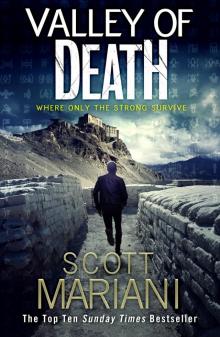 Valley of Death
Valley of Death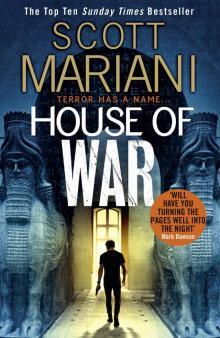 House of War
House of War The Pandemic Plot
The Pandemic Plot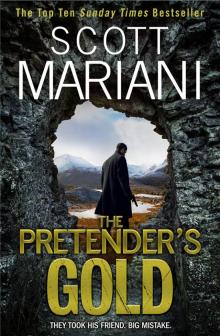 The Pretender's Gold
The Pretender's Gold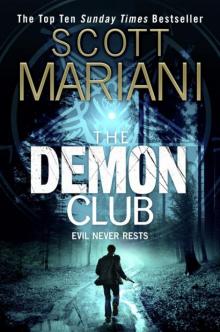 The Demon Club
The Demon Club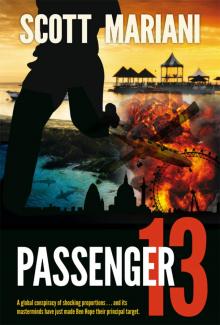 Passenger 13 (Ben Hope eBook originals)
Passenger 13 (Ben Hope eBook originals)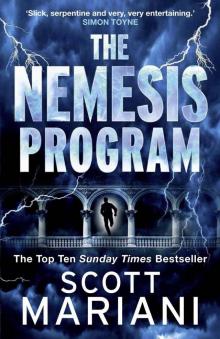 The Nemesis Program_Ben Hope
The Nemesis Program_Ben Hope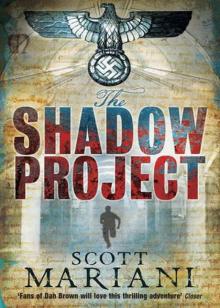 The Shadow Project
The Shadow Project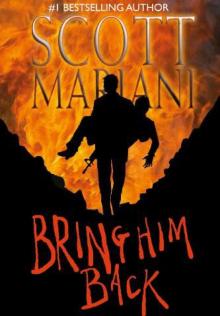 Bring Him Back
Bring Him Back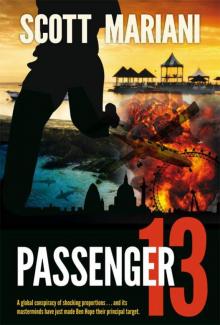 Passenger 13
Passenger 13 Sacred Sword (Ben Hope 7)
Sacred Sword (Ben Hope 7) The Sacred Sword (Ben Hope 7)
The Sacred Sword (Ben Hope 7) Sacred Sword
Sacred Sword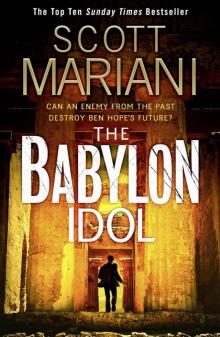 The Babylon Idol
The Babylon Idol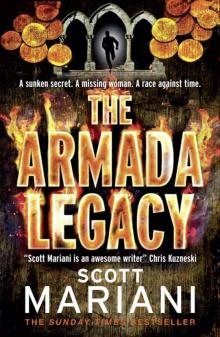 The Armada Legacy
The Armada Legacy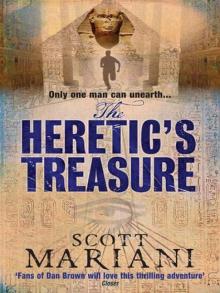 The Heretic's Treasure
The Heretic's Treasure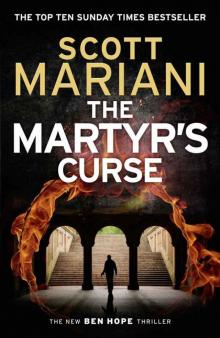 The Martyr’s Curse
The Martyr’s Curse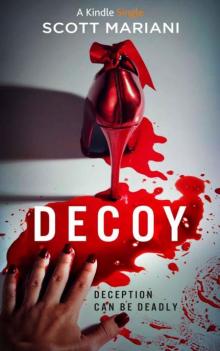 DECOY (Kindle Single)
DECOY (Kindle Single)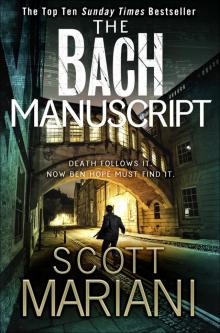 The Bach Manuscript
The Bach Manuscript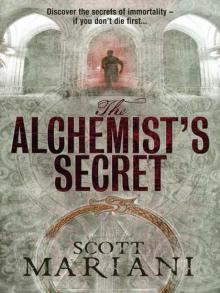 The Alchemist's Secret
The Alchemist's Secret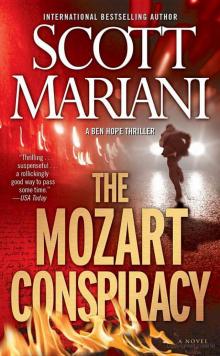 The Mozart Conspiracy: A Novel bh-2
The Mozart Conspiracy: A Novel bh-2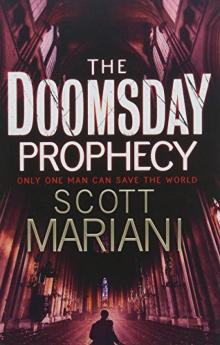 The Doomsday Prophecy
The Doomsday Prophecy The Ben Hope Collection: 6 BOOK SET
The Ben Hope Collection: 6 BOOK SET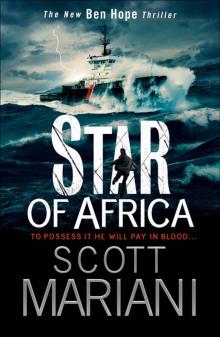 Star of Africa (Ben Hope, Book 13)
Star of Africa (Ben Hope, Book 13)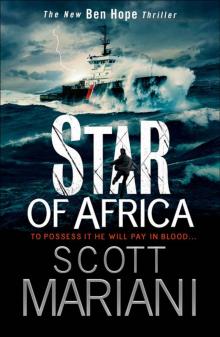 Star of Africa
Star of Africa The Forgotten Holocaust (Ben Hope, Book 10)
The Forgotten Holocaust (Ben Hope, Book 10)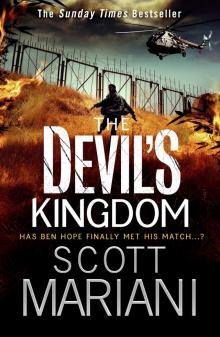 The Devil's Kingdom
The Devil's Kingdom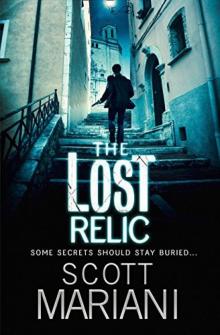 The Lost Relic
The Lost Relic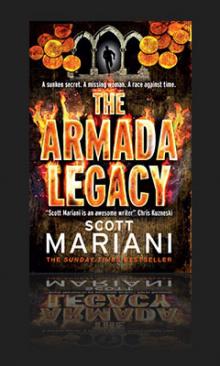 The Armada Legacy bh-8
The Armada Legacy bh-8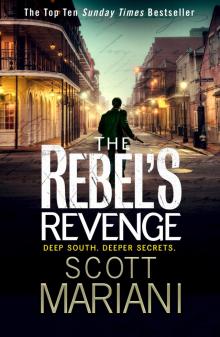 The Rebel's Revenge
The Rebel's Revenge The Forgotten Holocaust
The Forgotten Holocaust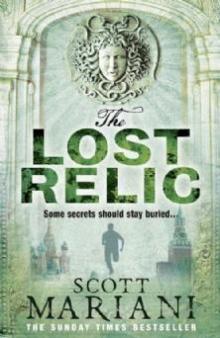 The Lost Relic bh-6
The Lost Relic bh-6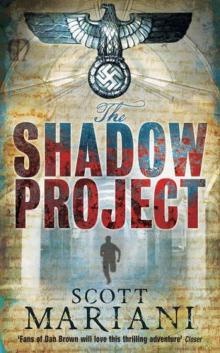 Ben Hope 05 - The Shadow Project
Ben Hope 05 - The Shadow Project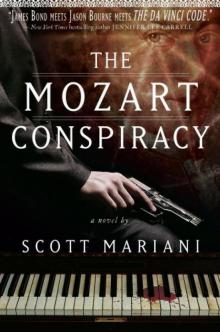 The Mozart Conspiracy
The Mozart Conspiracy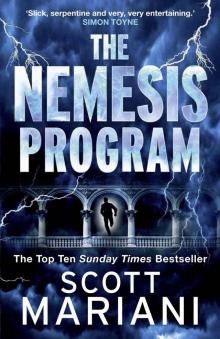 The Nemesis Program
The Nemesis Program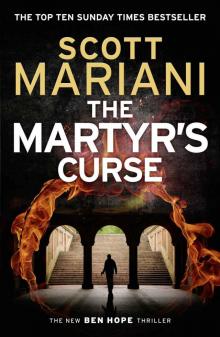 The Martyr’s Curse (Ben Hope, Book 11)
The Martyr’s Curse (Ben Hope, Book 11) THE TUNNEL: A Ben Hope Story
THE TUNNEL: A Ben Hope Story The Sacred Sword bh-7
The Sacred Sword bh-7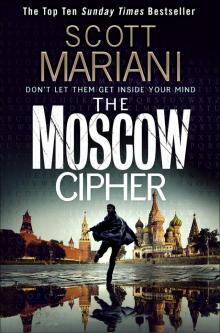 The Moscow Cipher
The Moscow Cipher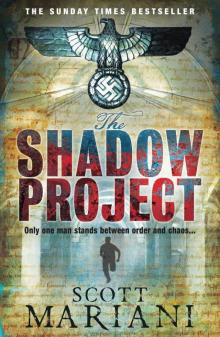 The Shadow Project bh-5
The Shadow Project bh-5 The Tunnel
The Tunnel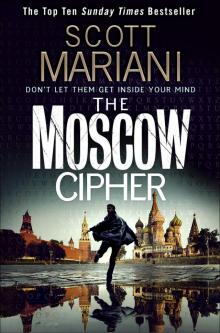 The Moscow Cipher (Ben Hope, Book 17)
The Moscow Cipher (Ben Hope, Book 17)